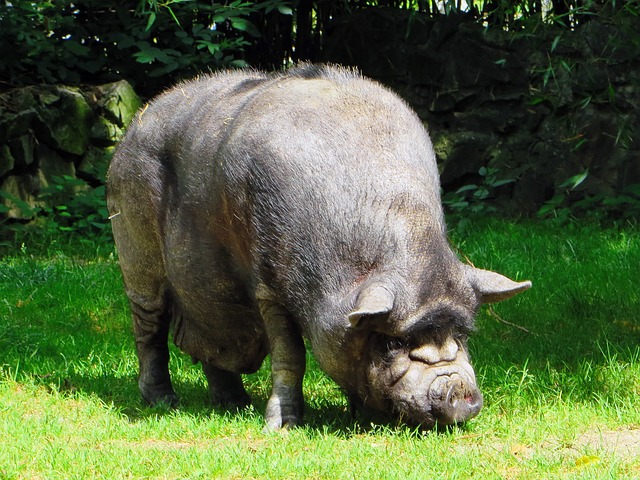



Feeding Vietnamese pigs requires a good understanding of their nutritional needs. These pigs are known for their fast growth rate and high feed efficiency, which means they require a diet that is rich in essential nutrients. The key nutrients that Vietnamese pigs need include protein, carbohydrates, fats, vitamins, and minerals.
Protein is essential for muscle development and growth, so it is important to provide a feed that contains a high percentage of protein. Carbohydrates provide energy for the pigs, while fats are a concentrated source of energy. Vitamins and minerals are necessary for overall health and proper functioning of the pig's body.
By understanding the nutritional needs of Vietnamese pigs, you can ensure that they receive a balanced diet that promotes optimal growth and health.
When it comes to feeding Vietnamese pigs, choosing the right feed is crucial. There are various types of pig feed available in the market, including commercial feeds and homemade feeds. Commercial feeds are formulated to meet the nutritional needs of pigs and are convenient to use. Homemade feeds, on the other hand, can be cost-effective but require careful formulation to ensure they provide all the necessary nutrients.
When selecting a feed for Vietnamese pigs, look for one that is specifically formulated for their needs. The feed should have a high protein content, typically around 16-18%. It should also contain a good balance of carbohydrates, fats, vitamins, and minerals. Additionally, consider the age and weight of the pigs when choosing the feed, as their nutritional requirements may vary.
Consulting with a veterinarian or nutritionist can be helpful in determining the best feed for your Vietnamese pigs.
Establishing a feeding schedule and practicing portion control is essential for the proper growth and health of Vietnamese pigs. Pigs should be fed at regular intervals throughout the day to ensure they receive a consistent supply of nutrients.
Divide the daily feed into multiple meals and feed the pigs at the same time each day. This helps to regulate their digestion and prevents overeating. Overfeeding can lead to obesity and other health issues, so it is important to control the portion size.
Monitor the pigs' appetite and adjust the portion size accordingly. It is better to slightly underfeed than to overfeed. If the pigs finish their feed quickly and are still hungry, you can gradually increase the portion size. On the other hand, if they leave feed behind, you may need to reduce the portion size.
Water is an essential component of a pig's diet, and providing clean and fresh water is crucial for their health and well-being. Vietnamese pigs require an adequate supply of water to maintain proper hydration, aid digestion, and regulate body temperature.
Ensure that the pigs have access to clean water at all times. Regularly clean and refill their water containers to prevent the growth of bacteria and algae. The water should be free from contaminants and at a temperature that is comfortable for the pigs to drink.
Monitor the water consumption of the pigs. If you notice a decrease in water intake, it may indicate a health issue, and you should consult a veterinarian.
In addition to a balanced diet, Vietnamese pigs may benefit from supplementation with vitamins and minerals. These micronutrients play a crucial role in various physiological processes and can contribute to the overall health and growth of the pigs.
Consult with a veterinarian or nutritionist to determine if your pigs require any specific vitamin or mineral supplements. They can assess the pigs' diet and recommend appropriate supplements based on their nutritional needs.
It is important to note that supplementation should not replace a balanced diet but rather complement it. Excessive supplementation can be harmful, so it is essential to follow the recommended dosage and guidelines provided by the veterinarian or nutritionist.
Regular monitoring of the pigs' feed intake is essential to ensure they are receiving an adequate amount of nutrients. Keep track of the amount of feed consumed by each pig and compare it to their growth rate and body condition.
If a pig is not gaining weight or is showing signs of malnutrition, it may indicate that they are not consuming enough feed. In such cases, you may need to adjust the portion size or consider changing the feed to a more nutrient-dense option.
On the other hand, if a pig is gaining weight too rapidly or becoming overweight, it may be necessary to reduce the portion size or switch to a feed with a lower energy content.
Regularly monitoring and adjusting the feed intake ensures that the pigs receive the right amount of nutrients for optimal growth and health.
Maintaining proper hygiene and sanitation is crucial for the health and well-being of Vietnamese pigs. Dirty and unclean feeding areas can lead to the growth of bacteria and the spread of diseases.
Regularly clean the feeding areas, removing any leftover feed, feces, and other debris. Use appropriate disinfectants to kill bacteria and prevent the spread of diseases. Ensure that the pigs have a clean and comfortable environment to eat in.
Additionally, practice good personal hygiene when handling the pigs and their feed. Wash your hands thoroughly before and after feeding the pigs to prevent the transmission of any pathogens.
When it comes to feeding Vietnamese pigs, it is always beneficial to seek professional advice. Consulting with a veterinarian or nutritionist who specializes in pig nutrition can provide valuable insights and guidance.
They can assess the pigs' nutritional needs, recommend appropriate feeds and supplements, and help you develop a feeding plan that is tailored to your specific situation. They can also provide guidance on managing any health issues or concerns related to feeding.
A veterinarian or nutritionist can be a valuable resource in ensuring the optimal growth and health of your Vietnamese pigs.
Implementing good feeding management practices is essential for the success of your Vietnamese pig feeding program. This includes proper record-keeping, regular monitoring, and maintaining a consistent feeding routine.
Keep detailed records of the pigs' feed intake, growth rate, and any health issues or concerns. This information can help you identify any patterns or trends and make informed decisions regarding their feeding.
Regularly monitor the pigs' body condition, weight, and overall health. This allows you to make adjustments to their feed intake or diet as needed.
Stick to a consistent feeding routine, providing feed at the same time each day. Pigs thrive on routine, and a consistent feeding schedule helps to regulate their digestion and prevent stress.
Feeding Vietnamese pigs is not a one-size-fits-all approach. It is important to regularly evaluate and adjust your feeding strategies based on the pigs' individual needs and performance.
Monitor the pigs' growth rate, body condition, and overall health. If you notice any issues or concerns, consult with a veterinarian or nutritionist to determine the best course of action.
Periodically review the pigs' diet and consider making adjustments to ensure they are receiving a balanced and nutritious feed. This may involve changing the feed type, adjusting the portion size, or adding supplements.
By regularly evaluating and adjusting your feeding strategies, you can optimize the growth and health of your Vietnamese pigs.
Feeding Vietnamese pigs requires a good understanding of their nutritional needs, choosing the right feed, establishing a feeding schedule, providing clean water, supplementing with vitamins and minerals, monitoring and adjusting feed intake, ensuring proper hygiene, consulting with professionals, implementing good feeding management practices, and regularly evaluating and adjusting feeding strategies. By following these best practices, you can promote optimal growth and health in your Vietnamese pigs.
Related posts